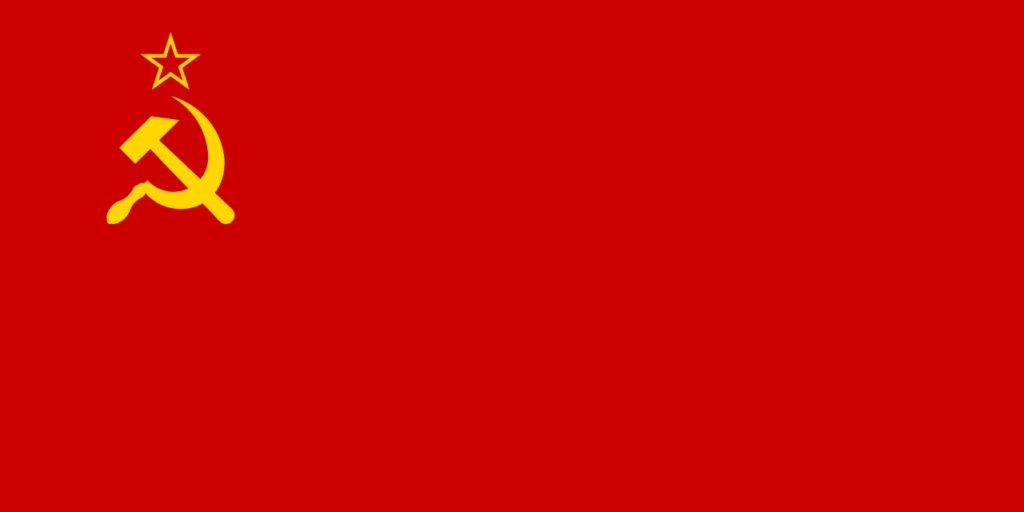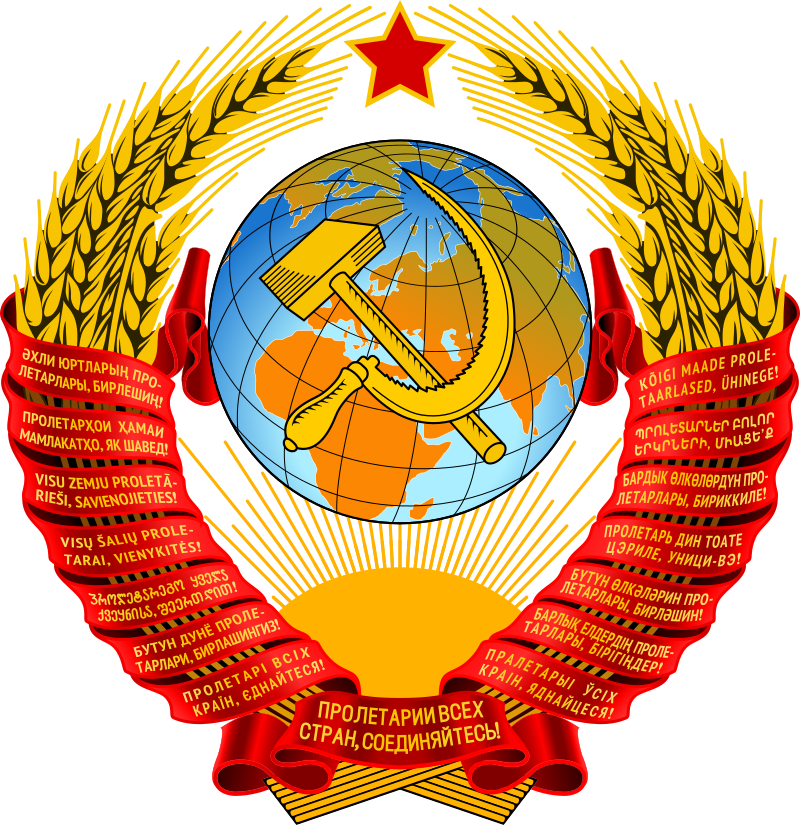
FROM WIKIPEDIA COMMONS
The Soviet Union, officially the Union of Soviet Socialist Republics (USSR), was a communist state that spanned Eurasia from 1922 to 1991. It was nominally a federal union of multiple national republics; in practice its government and economy were highly centralized until its final years. The country was a one-party state (prior to 1990) governed by the Communist Party of the Soviet Union, with Moscow as its capital within its largest and most populous republic, the Russian SFSR. Other major urban centers were Leningrad (Russian SFSR), Kiev (Ukrainian SSR), Minsk (Byelorussian SSR), Tashkent (Uzbek SSR), Alma-Ata (Kazakh SSR) and Novosibirsk (Russian SFSR). It was the largest country in the world, covering over 22,402,200 square kilometres (8,649,500 sq mi), and spanning eleven time zones.
The Soviet Union had its roots in the October Revolution of 1917 when the Bolsheviks, headed by Vladimir Lenin, overthrew the Provisional Government that had earlier replaced the house of Romanov of the Russian Empire. They established the Russian Soviet Republic, the world’s first constitutionally guaranteed socialist state. Tensions escalated into a civil war between the Bolshevik Red Army and many anti-Bolshevik forces across the former Empire, among whom the largest faction was the White Guard. The White Guard engaged in violent anti-communist repression against the Bolsheviks and suspected worker and peasant Bolsheviks known as the White Terror. The Red Army expanded and helped local Bolsheviks take power, establishing soviets, repressing their political opponents and rebellious peasants through Red Terror. By 1922, the balance of power had shifted and the Bolsheviks had emerged victorious, forming the Soviet Union with the unification of the Russian, Transcaucasian, Ukrainian and Byelorussian republics. Upon the conclusion of the civil war Lenin’s government introduced the New Economic Policy, which led to a partial return of a free market and private property; this resulted in a period of economic recovery.
Following Lenin’s death in 1924, Joseph Stalin came to power. Stalin suppressed all political opposition to his rule inside the Communist Party and inaugurated a command economy. As a result, the country underwent a period of rapid industrialization and forced collectivization, which led to significant economic growth, but also led to a man-made famine in 1932–1933. The Gulag labour camp system was also expanded in this period. Stalin also fomented political paranoia and conducted the Great Purge to remove his actual and perceived opponents from the Party through mass arrests of military leaders, Communist Party members, and ordinary citizens alike, who were then sent to correctional labor camps or sentenced to death.
On 23 August 1939, after unsuccessful efforts to form an anti-fascist alliance with Western powers, the Soviets signed a non-aggression pact with Nazi Germany. After the start of World War II, the formally neutral Soviets invaded and annexed territories of several Eastern European states, including the eastern regions of Poland, Lithuania, Latvia and Estonia. In June 1941 the Germans invaded, opening the largest and bloodiest theater of war in history. Soviet war casualties accounted for the majority of Allied casualties of the conflict in the process of acquiring the upper hand over Axis forces at intense battles such as Stalingrad. Soviet forces eventually captured Berlin and won World War II in Europe on 9 May 1945. The territory overtaken by the Red Army became satellite states of the Eastern Bloc. The Cold War emerged in 1947, where the Eastern Bloc confronted the Western Bloc, which would unite in the North Atlantic Treaty Organization in 1949.
Following Stalin’s death in 1953, a period known as de-Stalinization and the Khrushchev Thaw occurred under the leadership of Nikita Khrushchev. The country developed rapidly, as millions of peasants were moved into industrialized cities. The USSR took an early lead in the Space Race with the first ever satellite and the first human spaceflight and the first probe to land on another planet, Venus. In the 1970s, there was a brief détente of relations with the United States, but tensions resumed when the Soviet Union deployed troops in Afghanistan in 1979. The war drained economic resources and was matched by an escalation of American military aid to Mujahideen fighters.
In the mid-1980s, the last Soviet leader, Mikhail Gorbachev, sought to further reform and liberalize the economy through his policies of glasnost and perestroika. The goal was to preserve the Communist Party while reversing economic stagnation. The Cold War ended during his tenure and in 1989, Warsaw Pact countries in Central and Eastern Europe overthrew their respective Marxist-Leninist regimes. Strong nationalist and separatist movements broke out across the USSR. Gorbachev initiated a referendum—boycotted by Lithuania, Latvia, Estonia, Armenia, Georgia, and Moldova — which resulted in the majority of participating citizens voting in favor of preserving the Union as a renewed federation. In August 1991, a coup d’état was attempted by Communist Party hardliners. It failed, with Russian President Boris Yeltsin playing a high-profile role in facing down the coup. The main result was the banning of the Communist Party. The republics, led by Russia and Ukraine, declared independence. On 25 December 1991, Gorbachev resigned. All the republics emerged from the dissolution of the Soviet Union as independent post-Soviet states. The Russian Federation (formerly the Russian SFSR) assumed the Soviet Union’s rights and obligations and is recognized as its continued legal personality in world affairs.
The Soviet Union produced many significant social and technological achievements and innovations regarding military power. It boasted the world’s second-largest economy and the largest standing military in the world. The USSR was recognized as one of the five nuclear weapons states. It was a founding permanent member of the United Nations Security Council as well as a member of the OSCE, the WFTU and the leading member of the Council for Mutual Economic Assistance and the Warsaw Pact.
Before its dissolution, the USSR had maintained its status as a superpower, alongside the United States, for four decades after World War II. Sometimes also called “Soviet Empire“, it exercised its hegemony in East-Central Europe and worldwide with military and economic strength, proxy conflicts and influence in developing countries and funding of scientific research, especially in space technology and weaponry.

TODAY’S ALMANAC
Question of the Day
What is the celestial equator?The celestial sphere is an imaginary sphere projected out into space, with the observer at its center. It represents the entire sky, and all celestial objects other than Earth are imagined as being located on its inside surface. If Earth’s axis were extended, the points where it would intersect the celestial sphere are called the celestial poles, being directly above Earth’s poles. The circle in the sphere halfway between the celestial poles is called the celestial equator. It can be thought of as Earth’s equator projected onto the celestial sphere. Astronomers use the equatorial coordinate system for indicating the positions of stars and other heavenly objects on the celestial sphere.
Advice of the Day
If you want to win, return good for evil.
Home Hint of the Day
Generally speaking, if you have a slate roof, leave your roof work to a professional. An experienced roofer has the know-how and the proper tools to do the job without breaking the fragile tiles.
Word of the Day
Moon’s placeAstronomical: The actual position of the Moon within the constellations on the celestial sphere. Astrological: The astrological position of the Moon within the zodiac according to calculations made more than 2,000 years ago. Because of precession of the equinoxes and other factors, this is not the Moon’s actual position in the sky.
Puzzle of the Day
When you speak to a lady, you’ll find that this name read backward or forward is always the same.Madam
Died
- John Winthrop (founder of Mass. Bay Colony) – 1649
- Ludwig van Beethoven (composer) – 1827
- Walt Whitman (poet) – 1892
- Sarah Bernhardt (actress) – 1923
- Margaret Millar (Canadian author) – 1994
- Jan Sterling (star of Hollywood’s film noir movies in the 1940s and 1950s) – 2004
- Paul Hester (drummer) – 2005
- Paul Dana (race car driver) – 2006
- Harry Wesley Coover Jr. (inventor of Super Glue) – 2011
- Geraldine Ferraro (in 1984 became the first woman vice presidential candidate on a major U.S. party ticket) – 2011
Born
- Robert Frost (writer) – 1874
- Tennessee Williams (playwright) – 1911
- Gen. William Westmoreland (military commander) – 1914
- Bob Elliot (comedian) – 1923
- Sandra Day O’Connor (first female U.S. Supreme Court justice) – 1930
- Leonard Nimoy (actor) – 1931
- Alan Arkin (actor) – 1934
- James Caan (actor) – 1939
- Bob Woodward (journalist) – 1943
- Diana Ross (singer) – 1944
- Steven Tyler (musician; lead singer of Aerosmith) – 1948
- Vicki Lawrence (actress) – 1949
- Martin Short (actor) – 1950
- Curtis Sliwa (founder of the Guardian Angels) – 1954
- Kenny Chesney (country singer) – 1968
- Keira Knightley (actress) – 1985
Events
- Congress created the Territory of Orleans– 1804
- North West Company merged with Hudson’s Bay Company– 1821
- An estimated 7.4-magnitude earthquake occurred in Owens Valley, California– 1872
- Popeye statue unveiled during spinach festival, Crystal City, Texas– 1937
- Deadly dynamite explosion in quarry, Sandts Eddy, Pennsylvania– 1942
- The U.N. Security Council met for the first time in New York– 1946
- Dr. Jonas Salk announced development of polio vaccine– 1953
- Perpetrators of the Great Train Robbery were convicted in London– 1964
- North Vietnamese took Hue (Vietnam War)– 1975
- Groundbreaking took place in Washington, D.C., for a memorial to honor American armed forces members killed in Vietnam– 1982
- The U.S. government sold its 85% ownership of Conrail, one of the nation’s largest rail systems, and earned $1.6 billion in one of the largest stock offerings in history– 1987
- The post-perestroika Soviet Union held its first nationwide multiparty, multicandidate elections– 1989
- A 2-pound 5-ounce yellow hybrid bass was caught in the Kiamichi River of Oklahoma– 1991
- Melissa macro computer virus released, disrupting systems worldwide– 1999
- A 12-pound walleye was caught with fly tackle in Manistee River, Michigan– 1999
Weather
- Nineteen inches of snow, Chicago, Illinois– 1930
- 28.76” barometric pressure, Omaha, Nebraska– 1950
- The temperature at Allakaket, Alaska, was 69 degrees below zero F– 1954
COURTESY www.almanac.com

Everything is very open and very clear explanation of issues. was truly information. Your website is very useful. Thanks for sharing.